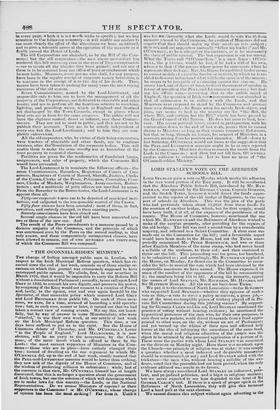"THE O'CONNELL-RIDDEN MINISTRY."
THe change of feeling amongst public men in London, with respect to the Irish Municipal Reform question, which has oc- curred since the end of last week, reminds us of three similar oc- casions on which this journal was erroneously supposed to have outstepped public opinion. We allude, first, to our assertion in March 1831, that it would be impossible to carry the Reform Bill without a dissolution of Parliament ; secondly, to our call upon Lord GREY in 1832, to consult his own dignity,and preserve his power, by resigning if the King would not consent to a creation of Peers; and, lastly, to the upshot, over and over again foretold by the Spectator, of that miserable policy which removed Lord GREY and Lord BROUGHAM from public life. On each of these occa- sions, we were, for a time, accused of hazarding a wild specula- tion; but., in each case, sooner or later, it turned out that we had taken a correct view of coming events. We say this, not boast- fully, but by way of answer to some Ministerialists, who were "startled," to use their own word, at our article of last week on the Irish Municipal Reform question. This time, a few days have sufficed to put us in the right. See the House of Commons debate of Thursday, and Mr. O'CONNELL'S Letter "to the People of England." Lord MELBOURNE, it is now obvious, will be no party to the acceptance, by the Com- mons, of the mere insult which is offered to them by the Lords: the most earnest supporters of Ministers in the Com- mons—those who are in place—have entirely changed their tone; instead of dwelling on the one argument by which Mr. O'CONNELL did, up to the end of last week, stoutly contend that the PEEL-and-LvNiessunsT measure would be better than nothing. they now talk of the dignity of the House of Commons, and of the wisdom of preferring collision to submission : while, last of the converts to that view, Mr. O'Coerentee himself has at length discovered, that this is no longer a question about the government of Irish towns, but one the solution of which will determine which are to make laws for this country—the Lords, or the National Representatives. Do we accuse Ministers of caprice? or their supporters in the Gammons? or Mr. O'CONNELL, whose change of opinion has bees the most striking? Fax from it. Until it was kin Wit eastitictly what the Lords would do with the Reform measure eressed by the Commons, the eosition of MInieters did not requile that they should make up their milt& on this subject ; their out-and-out supporters naturally "follow my leader ;" and Mr. O'Coeterhee, as Inc is altngether the creature, so is he necessarily the shave of public opinion. The last expression is not too strong. What the Tories call "OConne!lism " is a pure fancy : Mose. NELL, the p liticiati, would ho lost, if he hail a will of his own, adverse to that of the masses whose power he represents when he represents their feelings. Nay, his fitness fora poll t lee] !ceder seems to consist mainly of a peculiar faculty or instinct, by which he is en.. tailed to discover bethrehand what will be the opinion of the masses: he seems to be incapable of swimming against the stream. He strove hard, out or doors at least, to iliiect the current of opinion in favour of accepting the PEE lea nil-Lv lute RST measure ; but find- ing his effort,: vahn—pereeiving that in the public mind of • England, the question of Irish townegovernment was absorbed in that of submission to or collision with the Lords, and that Ministers were erepared to stand by the Commons and prevent their own dismissite—he flings away his merely Irish objet, and joins, nay scents to lead in the popular cry: for "the Bill, the whole Bill, and within., but the Bill," which has been passed by the Great Council of the Nation. He does but seem to lead, how- ever. II is recent political letter, viewed in juxtaposition with his conversation down to the end of last wiek, proves that lie cannot dictate to Ministers so long as they remain consistent Reformers, but that so long, though no longer, his support of Ministers is a necessity arising from his position awl character. Mind—down to last Saturday. O'CONNELL Would IRA listen to the suggestion that the PEEL-atel-Lvemi mese. measure ought to be at once rejected by the Commons ; Ministers decline to convey the itisult from the Lords to the Commons : and then, but not till then, O'CONNELL prefers collision to submissim. Let us hear no more of "the O'Connell-ridden Ministry."


























 Previous page
Previous page